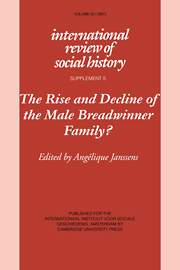 The Rise and Decline of the Male Breadwinner Family?
The Rise and Decline of the Male Breadwinner Family? Book contents
- Frontmatter
- Contents
- NOTES ON CONTRIBUTORS
- 1 The Rise and Decline of the Male Breadwinner Family? An Overview of the Debate
- 2 The Origins and Expansion of the Male Breadwinner Family: The Case of Nineteenth-Century Britain
- 3 Gendered Exclusion: Domesticity and Dependence in Bengal
- 4 Breadwinning Patterns and Family Exogenous Factors: Workers at the Tobacco Factory of Seville during the Industrialization Process, 1887–1945
- 5 Family, Work and Wages: The Stéphanois Region of France, 1840–1914
- 6 Welfare State Attitudes to the Male Breadwinning System: The United States and Sweden in Comparative Perspective
- 7 Comparing the Post-War Germanies: Breadwinner Ideology and Women's Employment in the Divided Nation, 1948–1970
- Notes On Contributors
1 - The Rise and Decline of the Male Breadwinner Family? An Overview of the Debate
Published online by Cambridge University Press: 04 August 2010
- Frontmatter
- Contents
- NOTES ON CONTRIBUTORS
- 1 The Rise and Decline of the Male Breadwinner Family? An Overview of the Debate
- 2 The Origins and Expansion of the Male Breadwinner Family: The Case of Nineteenth-Century Britain
- 3 Gendered Exclusion: Domesticity and Dependence in Bengal
- 4 Breadwinning Patterns and Family Exogenous Factors: Workers at the Tobacco Factory of Seville during the Industrialization Process, 1887–1945
- 5 Family, Work and Wages: The Stéphanois Region of France, 1840–1914
- 6 Welfare State Attitudes to the Male Breadwinning System: The United States and Sweden in Comparative Perspective
- 7 Comparing the Post-War Germanies: Breadwinner Ideology and Women's Employment in the Divided Nation, 1948–1970
- Notes On Contributors
Summary
INTRODUCTION
In recent years feminist scholars have called for a complete rethinking and revision of the foundations of labour history as a necessary prerequisite for the integration of gender as a core concept into histories of labour and social class. In this attempt one of the most deeply rooted assumptions in male-oriented labour history needs to be identified and made subject to careful rethinking, namely the assumption that the public and the private sphere should be seen in terms of an essentially gendered opposition. Undoubtedly, one of the most powerful images used not only to represent but also to justify the gendering of the public and the private sphere is the image of the male breadwinner family and the male household head as the sole provider for his dependent wife and children. For this reason, the articles in this volume are all firmly at the heart of what may currently be seen as the crucial intersections in the history of labour, gender and social class.
At the same time, the male breadwinner family is the focus of many pressing academic and policy concerns, receiving ample attention from historians and social scientists alike. In a recent review article, Colin Creighton summarized the ongoing historical and sociological debates on the male breadwinner family, calling for integration and synthesis. It is tempting to relate this renewed interest in the male breadwinner family to its apparent demise in most parts of the Western world. Since roughly the 1960s or 1970s most Western countries have experienced a remarkable and substantial rise in female labour force participation. This is undeniably one of the major historical developments of the modern era.
- Type
- Chapter
- Information
- The Rise and Decline of the Male Breadwinner Family?Studies in Gendered Patterns of Labour Division and Household Organisation, pp. 1 - 24Publisher: Cambridge University PressPrint publication year: 1998
- 9
- Cited by


